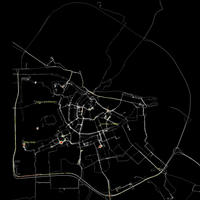 Patterns interest me greatly. No, not on wallpaper or embroidery. The patterns that people or ideas or things might be arranged in, and what those different patterns mean, or what they allow to happen. That is essential to fields spanning from architecture to organization to language to magic. Patterns interest me greatly. No, not on wallpaper or embroidery. The patterns that people or ideas or things might be arranged in, and what those different patterns mean, or what they allow to happen. That is essential to fields spanning from architecture to organization to language to magic.
It is probably Chris Alexander who most brought forward that way of looking at patterns. He is an architect who wrote "A Pattern Language". It is at first glance a book about architecture, about building buildings. But really it is about the patterns of arranging things so that good things happen with and for people. It contains a 'vocabulary' of hundreds of detailed patterns and describes in detail why they are arranged that way, and what they accomplish. And what I find most interesting is the possibilities in taking a similar philosophy much further, and finding it in other places. The following is from a review of the book by audrey_the_librarian: "While others have noted that Alexander's ideas inspired changes in software engineering, I would also like to note that the author's ideas were, in turn, most likely informed by others, such as neuroscientist Karl Lashley and, in particular, linguist Noam Chomsky. Chomsky developed the idea of a generative grammar, composed of constituent symbols, a set of rules and a set of terminal elements, which together describe all possible sentences in a language. This was considered revolutionary at the time and is quite similar to Alexander's characterization of his patterns, described as a context combined with a system of forces or rules generating an infinite number of solutions in the form of sets of specific design elements. That configuration, in turn, becomes the context for another pattern. The theory's dynamism and scalability render it very powerful indeed.
I think another interesting approach to this philosophy would be to reverse engineer our own environment. To say, Obviously there is a Pattern Language at work in the larger world in which we live, and it is decidedly in opposition to what Mr. Alexander and others, including myself, believe is preferred. What are the rules of that language? What is the context within which those elements operate? The author codifies a desirable Pattern Language. I'd like to see his principles used to turn an eye toward decodifying our own milieu. This is the kind of book that leads one to think and imagine, and isn't that a wonderful thing?" Yes, indeed, reverse engineering and decodifying the world we live in, to be able to talk about its patterns - that would be a very good thing.
[ Patterns | 2002-12-03 15:39 | | PermaLink ] More >
|
 Patterns interest me greatly. No, not on wallpaper or embroidery. The patterns that people or ideas or things might be arranged in, and what those different patterns mean, or what they allow to happen. That is essential to fields spanning from architecture to organization to language to magic.
Patterns interest me greatly. No, not on wallpaper or embroidery. The patterns that people or ideas or things might be arranged in, and what those different patterns mean, or what they allow to happen. That is essential to fields spanning from architecture to organization to language to magic.
 In an experiment in Amsterdam lots of the city's inhabitants were equipped with GPS (Global Positioning System) devices for two months, in order to make a realtime map of the city. The map is created exclusively from the accummulated movements of individuals. And, of course, people who ride bicycles create different maps from people in cars or subways.
In an experiment in Amsterdam lots of the city's inhabitants were equipped with GPS (Global Positioning System) devices for two months, in order to make a realtime map of the city. The map is created exclusively from the accummulated movements of individuals. And, of course, people who ride bicycles create different maps from people in cars or subways.